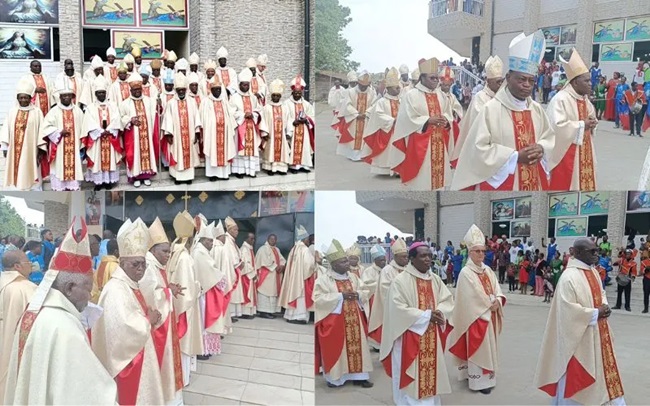Privacy Overview
This website uses cookies so that we can provide you with the best user experience possible. Cookie information is stored in your browser and performs functions such as recognising you when you return to our website and helping our team to understand which sections of the website you find most interesting and useful.


















13, July 2017
The trial of Amadou Vamoulké: A man more sinned against than sinning 0
It is difficult to say exactly when the trial involving the Public Prosecutor and Cameroon Radio and Television (Crtv) against Amadou Vamoulké will take place at the Special Criminal Court. The former general manager of the state radio and television is prosecuted for an alleged misappropriation of nearly four billion FCFA.
However, it is known that one year after the legal proceedings against the former GM of Crtv started; there is an evolution in his file. Cameroon Concord News understands that judicial investigation has been closed for two weeks now, by an order of reference to the Special Criminal Court so that the accused will be made to appear before the court. Amadou Vamoulké will have to answer for an alleged diversion of nearly four billion FCFA.
On the 28th of June 2017, the man that the Beti Ewondo political elites replaced with Charles Ndongo at the helm of CRTV, was at the Special Criminal Court. On that day he was notified of the report of the inquiry into his case. According to the order of partial dismissal and referral to the Special Criminal Court, the state prosecutor accused the ex-GM of Crtv of having falsified the amounts of the TV license fee. The inflated amounts are estimated at 3.9 billion FCFA.
The Amadou Vamoulké file is a subject that still arouses some curiosities. Sources close to this case have revealed that before completing the judicial investigation, the judges sent several reports to their hierarchy in which they explained that they had not been able to demonstrate how Amadou Vamoulké was able to intervene in the influx of the audiovisual fee charged to it. The four experts commissioned by the Special Criminal Court also demonstrated that Amadou Vamoulké could not have manipulated an account housed in the Treasury Department and not at Crtv.
Depicting the Special Criminal Court established to prosecute alleged corrupt government officials and the several Alibabas responsible for pilfering from the public treasury as the President’s court is no misnomer. We call it the President’s court because it is one instrument of power through which the President is reining in on perceived opponents from within his CPDM power conduit. An attribute of a genuine court is the fairness of the trial proceedings in cases which are brought before the court for trial. It is not the number of convictions entered against accused. A court is legitimate and recognized as such because of its exercise of judicial, executive, legislative and administrative independence. A court that is independent must be accessible to all citizens after all, is equality before the law, not a constitutionally protected value? The Special Criminal Court is lacking in these attributes of impartiality, judicial independence and accessibility. It is perceived more as the President’s Court than a Court of Justice.
Establishing this court was President Biya’s way of saving himself the embarrassment of being humiliated during his perennial trips abroad as the President of the most corrupt countries in the world. This ranking of the country as the most corrupt or one of the most corrupt countries had a potential to hamper President Biya’s personal pecuniary interests far from the borders of Cameroon. There was therefore a personal interest need to establish the court. Another personal interest need was to avail himself of a legal tool under his direct control to consolidate absolute power, blackmail potential rebels and competitors within the system and to stifle any form of institutional opposition. He perceived the court as a tool with which to whitewash his more than thirty years of corrupt governance and the rape of the economy.
With the war against Boko Haram, the fight against corruption using the Special Criminal Court has afforded Paul Biya justification contest in the next institutionally flawed elections in order to eternalize power purportedly to direct the war against terror and the war against corruption. True to the name the President’s Court, the President has exclusive preserve in referring cases to the Special Court and the power to terminate them. He decides who will be arrested, who will be investigated and who will serve time and who will not.
In one instance, he ordered a detained the late Minister Bapes Bapes released from remand custody at Kondengui when a warrant was issued for his arrest without the presidential fiat. Recently Titus Edzoa a former Secretary-General at the Presidency of the Republic benefitted from a purported Presidential pardon whose primary purpose was the release of a French citizen Thiery Atangana from jail.
The fear of a presidential referral to the Special Criminal Court on additional charges of corruption under a practice devolved under the supervision of Paul Biya called “rouleur compresseur” pushed Titus Edzoa to rejoin the CPDM Party without a public resignation or repudiation of his membership of the party on which he intended to contest presidential elections prior to his incarceration. Edzoa was a victim of this system of presidential justice when new charges were brought against him when his first imprisonment was about to end in order to maintain him in prison.
Cameroonians want the rule of law to be the guarding principle on which justice is administered in the name of the people
By Soter Tarh Agbaw-Ebai
Cameroon Concord News Group